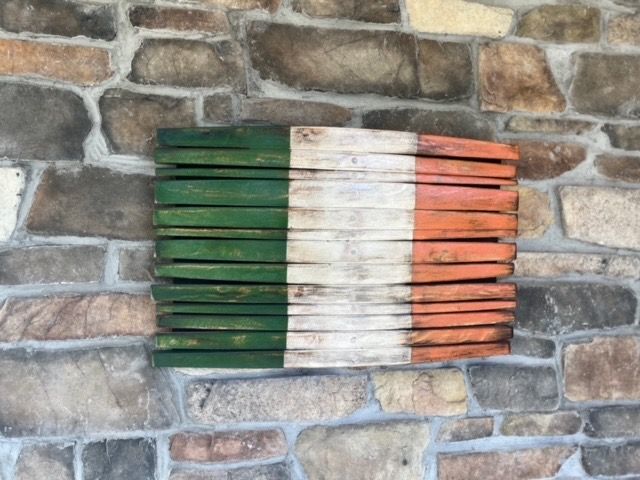Michael Hughes's second novel, "Country," has just been published in the United States. PHOTO BY SARAH LAVERTON
Page Turner / Edited by Peter McDermott
You may have seen the novelist Michael Hughes recently in an episode of the critically-acclaimed drama “Chernobyl.” He is listed, though, as Michael Colgan, his professional name in that world.
“I occasionally pop up on TV as the red herring in a British crime drama,” he said.
It may be with less visibility in the literal sense, but things have been really happening for him in his other career
“Daring, ambitious and inventive,” the Guardian commented about his second novel, naming it as one of the books of 2018.
Hughes said of “Country,” which is being published this week in the U.S., “It’s a retelling of the ‘Iliad’ set during the closing years of the Northern Ireland conflict. The characters and basic story will be familiar to readers of Homer, and for everyone else, it works just fine as a straight political thriller.”
He added, “I grew up in a Catholic family near the border at the height of the violence, and I’ve been trying to write about the subject for a long time, but it wasn’t until I hit on the idea of borrowing an existing mythic structure that it came to life for me. My hunch was that the nature of armed conflict hasn’t changed very much in a few thousand years.”
The cover of the American edition features an admiring quote from leading Northern Irish crime fiction writer Stuart Neville to make the case for what Hughes has done: “A classic story, a gritty contemporary thriller…an extraordinary achievement.”
The reviews generally have been of the sort you’d write yourself if you could get away with it.
“A brutal and gripping thriller in its own right,” the Irish Independent said, “a consistently engrossing read, written in Ulster-flavored prose as rich and evocative as you would expect from a professional thespian.”
“It begs to be read aloud” the Times of London suggested. The Times Literary Supplement said it “explodes with verbal invention, rapid juxtaposition, brutality and fun,” while Literary Review commented that Hughes has written a “striking, memorable book.”
We could go on, but let’s have just one more, from rising young literary star Daisy Johnson, who wrote, “Reading this book is like sitting in the pub listening to a good friend tell you stories. It does what only the best retellings can and makes you see the myth anew.

Michael Hughes
Place of birth: I was born in Lurgan Hospital, but the family home was, and still is, in Keady, Co. Armagh. All eight of my great-grandparents are buried within 10 miles of that house, so when I say that’s where I come from, I really mean it.
Spouse: Cultural historian Tiffany Watt Smith, author of “The Book of Human Emotions” and “Schadenfreude: The Joy of Another’s Misfortune.”
Children: Two, a girl and a boy.
Residence: Suburban south east London, a few miles from my wife’s parents.
Published works: “Country” is my first U.S. publication. I have one other novel published in the UK, “The Countenance Divine,” an extravagant historical fantasia about John Milton, William Blake, Jack the Ripper and the Y2K problem.
What is your writing routine? Are there ideal conditions? All I really need to write is silence, though ideally, I’ll have books around me too. But I like to go out to work, so I usually write in a library, and once in a while I’ll go away for a couple of days to get a run at something, or to do a major edit. “Country” was written two or three days a week, from 10 till 4, over about eighteen months. Our second child was born halfway through the process, so I did a lot of the thinking in the dark at 3 a.m.
What advice do you have for aspiring writers? Finish what you start. And when you get stuck, skip ahead to the part you wish you were writing.
Name three books that are memorable in terms of your reading pleasure.
“Moby-Dick"; "Night Waking” by Sarah Moss; “The Van” by Roddy Doyle, which is the only time I can remember a book actually had me rolling on the floor laughing.
What book are you currently reading? The story collection “Sweet Home” by Wendy Erskine. Set in contemporary Belfast, and they’re among the best short stories I’ve ever read.
Is there a book you wish you had written?
“The Third Policeman” by Flann O’Brien. All the truly great writers are funny as hell.
Name a book that you were pleasantly surprised by?
I’ve had a great time recently getting to know the early romance novels of Jilly Cooper. They’re formulaic, for sure, but so is plenty of so-called serious fiction, and she’s a terrifically enjoyable writer by any standard.
If you could meet one author, living or dead, who would it be?
I have an awful feeling that most of my favorites wouldn’t be very pleasant company. I’d probably go for George Bernard Shaw, since he’s such a wonderfully provocative contrarian, and I love to have my preconceptions challenged.
What book changed your life?
It would be hard to overstate the effect of “Alice’s Adventures in Wonderland” on my imaginative landscape.
What is your favourite spot in Ireland?
These days, my mother’s house in Keady. I’m just back from a visit with my kids, and we always have a terrific time.
You’re Irish if...
you can tell you’re joking because your lips are moving.










